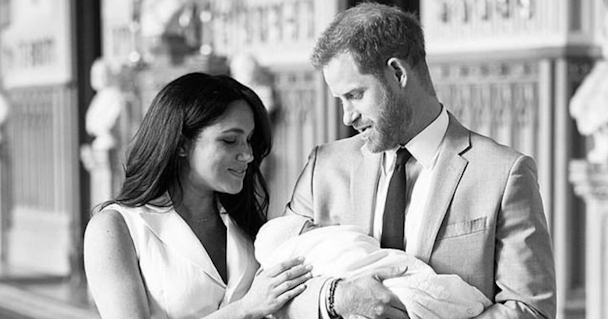Brands shouldn't prop up a media that prioritises royalty over climate change
Did you hear last week’s news about 1-million species being at risk of extinction? Or did you miss the message about this threat to humanity because it played second fiddle to one human baby (albeit, a royal) and an A-lister gathering that celebrated ‘Notes on Camp’ at the expense of 30,000+ bird feathers (thank you, Cardi B)?

Why aren't advertisers using their spending power to reappraise their relationship with traditional media? / Instagram - Chris Allerton @SussexRoyal
Our priorities are all wrong. And skewed media coverage is a big part of the problem. We drool over one vastly privileged British baby when we know UK child poverty is rife. We celebrate a clutch of A-listers investing grotesque sums of money into single-use costumes, even though we know sustainability is the key to protecting humanity. And us Brits, we love our animals… even though we turn a blind eye to the fact that a million species are being wiped out.
In the face of such adversity, it’s no wonder readers want light relief in the form of easy-to-digest celeb stories. And God knows I love a Met Gala party as much as the next person. So I get it. I really do. And I totally understand that as commercial operations, news outlets have to play to the popular by running the superficial alongside the meaningful. But not to the extent that the former completely overshadows the latter.
With evidence of climate crisis now all around us, things have got to change. And advertisers – the media’s primary source of funding – can be part of that change.
We can exercise our spending power in a way that encourages news outlets to use their mighty sphere of influence more constructively. Until we do, we are complicit in perpetuating the insatiable hunger for gossip and ‘sidebar of shame’ schadenfreude, at the expense of real news that can engineer positive change.
The advertising industry has an unrivalled understanding of the power of influence.
And although we’re constantly told ‘the people’ no longer trust established sources, the news clearly has an enormous role to play in shaping people’s views and consequent actions when it comes to climate crisis. By letting the media get away with burying real news – the stuff that highlights how our very existence is at stake – under fluffy stories, the advertising industry is guilty by association.
But what can we do about it? It’s tempting to think the matter is out of our hands, that our celebrity-obsessed culture is to blame, that advertisers – even if they wanted to – are powerless to affect change.
But they weren’t powerless when they found their ads unwittingly placed against content promoting extremism, paedophilia, pornography and violence. Once advertisers woke up to the YouTube brand safety scandal, pioneers like Keith Weed took a stand by threatening that Unilever would halt investment in online platforms that “breed division”. And it worked. YouTube et al are now at pains to implement measures that ensure brands’ ads won’t appear against inappropriate content.
My question is: why aren’t advertisers – especially those many, many brands that are scrambling to put sustainability at the top of their agendas – using their spending power to reappraise their relationship with the traditional media too?
If Keith Weed was prepared to remove Unilever ads from terrorism channels, why can’t today’s chief marketing officers threaten to remove their print and TV ads from the guilty culprits who place too much emphasis on superficial tittle-tattle and not enough on the one overriding story that affects literally everyone on the planet?
In the same way that Hope Not Hate puts pressure on advertisers not to support media outlets that sow hatred and division, we need to apply the same pressure on those advertisers that, knowingly or otherwise, feed parts of the media that would rather put a baby or grotesquely expensive single-use ‘Notes on Camp’ costume on their front page than one of the million species facing extinction.
We can no longer prop up a media that fawns over royalty and Met Gala celebs more than Greta Thunberg and David Attenborough.
The YouTube brand safety scandal showed how we can hold the media to account. Now it’s time to use this power to save what’s left of our planet. Because if we don’t, there will be no royalty, no Met Gala, no adland… no humanity.
Chris Gorell Barnes is chief executive and founder of Adjust Your Set and Co-Founder of BLUE Marine Foundation, a charity dedicated to creating marine reserves and establishing sustainable models of fishing. He tweets @cgorellbarnes
